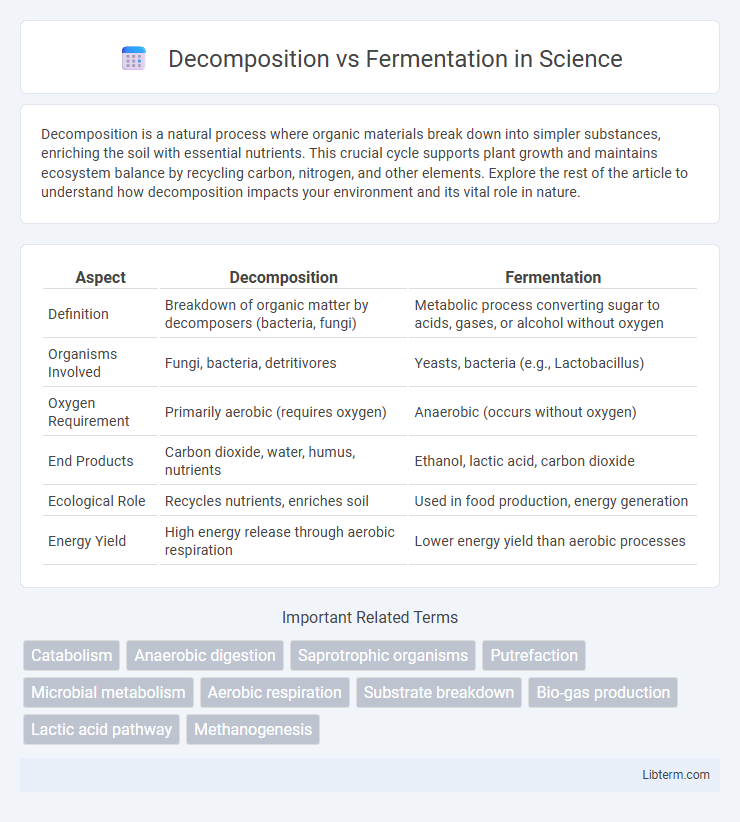Decomposition is a natural process where organic materials break down into simpler substances, enriching the soil with essential nutrients. This crucial cycle supports plant growth and maintains ecosystem balance by recycling carbon, nitrogen, and other elements. Explore the rest of the article to understand how decomposition impacts your environment and its vital role in nature.
Table of Comparison
| Aspect | Decomposition | Fermentation |
|---|---|---|
| Definition | Breakdown of organic matter by decomposers (bacteria, fungi) | Metabolic process converting sugar to acids, gases, or alcohol without oxygen |
| Organisms Involved | Fungi, bacteria, detritivores | Yeasts, bacteria (e.g., Lactobacillus) |
| Oxygen Requirement | Primarily aerobic (requires oxygen) | Anaerobic (occurs without oxygen) |
| End Products | Carbon dioxide, water, humus, nutrients | Ethanol, lactic acid, carbon dioxide |
| Ecological Role | Recycles nutrients, enriches soil | Used in food production, energy generation |
| Energy Yield | High energy release through aerobic respiration | Lower energy yield than aerobic processes |
Introduction to Decomposition and Fermentation
Decomposition is the natural process where organic matter breaks down into simpler substances through the action of bacteria, fungi, and other decomposers, releasing nutrients back into the soil. Fermentation is a biological process in which microorganisms, such as yeast and bacteria, convert organic compounds like sugars into alcohol, gases, or acids under anaerobic conditions. Both processes play essential roles in nutrient cycling and energy flow within ecosystems, but decomposition generally occurs in the presence of oxygen, whereas fermentation occurs without oxygen.
Definitions: What is Decomposition?
Decomposition is the natural process by which organic matter breaks down into simpler compounds through the activity of microorganisms, fungi, and invertebrates. This biological process recycles nutrients back into the ecosystem, facilitating soil fertility and plant growth. Unlike fermentation, decomposition typically occurs in the presence of oxygen and involves the aerobic breakdown of complex organic materials.
Understanding Fermentation
Fermentation is a metabolic process where microorganisms like yeast and bacteria convert sugars into gases, acids, or alcohol without oxygen, distinguishing it from decomposition, which breaks down organic matter aerobically or anaerobically into simpler compounds. This anaerobic process is essential in producing foods such as yogurt, sauerkraut, and alcoholic beverages, harnessing microorganisms like Lactobacillus and Saccharomyces cerevisiae. Understanding fermentation involves studying biochemical pathways like glycolysis and the role of enzymes in transforming substrates into energy and metabolic byproducts that preserve food and enhance its nutritional profile.
Key Differences Between Decomposition and Fermentation
Decomposition is a natural process where organic matter breaks down into simpler substances through the action of microorganisms, releasing nutrients back into the environment. Fermentation is a specific type of anaerobic decomposition where microorganisms like yeast or bacteria convert carbohydrates into alcohol, gases, or acids, often used in food production. The key difference lies in oxygen requirement: decomposition can be aerobic or anaerobic, while fermentation occurs strictly in the absence of oxygen.
Biological Processes Involved
Decomposition involves the breakdown of organic matter by a diverse community of bacteria, fungi, and detritivores that release enzymes to convert complex molecules like cellulose and lignin into simpler compounds. Fermentation is an anaerobic biological process performed by microorganisms such as yeast and certain bacteria, converting sugars into alcohols, acids, and gases through enzymatic pathways like glycolysis. Both processes play critical roles in nutrient cycling, with decomposition primarily occurring in aerobic environments and fermentation facilitating energy production in oxygen-deficient conditions.
Types of Microorganisms in Decomposition vs Fermentation
Decomposition primarily involves saprophytic bacteria and fungi that break down complex organic matter into simpler substances, facilitating nutrient recycling in ecosystems. Fermentation utilizes specific strains of bacteria and yeasts, such as Lactobacillus and Saccharomyces species, to convert sugars into acids, gases, or alcohol under anaerobic conditions. While decomposers are diverse and aerobic or facultative anaerobes, fermentative microorganisms are specialized anaerobes adapted to controlled environments for food and biofuel production.
Factors Influencing Each Process
Temperature significantly impacts both decomposition and fermentation, with optimal microbial activity occurring between 20degC and 40degC for decomposition and around 30degC for fermentation. Moisture levels are critical; high moisture enhances microbial metabolism in both processes, but excessive water can create anaerobic conditions favoring fermentation. Oxygen availability differentiates the processes: decomposition requires aerobic conditions for efficient breakdown, whereas fermentation thrives in anaerobic or low-oxygen environments promoting specific microbial pathways.
Environmental Impact of Decomposition and Fermentation
Decomposition releases greenhouse gases like carbon dioxide and methane, contributing significantly to global warming and climate change. Fermentation, primarily anaerobic, produces methane, a potent greenhouse gas, but can be managed in controlled environments to reduce emissions. Both processes impact nutrient cycling and soil health, but uncontrolled decomposition tends to have a higher environmental footprint due to greenhouse gas release and potential groundwater contamination.
Practical Applications and Uses
Decomposition plays a critical role in waste management by breaking down organic materials into simpler substances, which enhances soil fertility and supports composting processes widely used in agriculture and gardening. Fermentation is essential in food and beverage industries, transforming sugars into alcohol and acids, thereby producing products like bread, yogurt, beer, and wine while also preserving nutrients. Both processes contribute to sustainable resource recycling, with decomposition facilitating nutrient cycling in ecosystems and fermentation enabling biofuel production and biotechnological applications.
Conclusion: Choosing Between Decomposition and Fermentation
Choosing between decomposition and fermentation depends on the desired outcome and environmental conditions; decomposition breaks down organic matter aerobically, releasing nutrients essential for soil health, while fermentation occurs anaerobically, producing energy-rich compounds like alcohol or acids. Decomposition is ideal for nutrient recycling in ecosystems, whereas fermentation is preferred in food production and bioenergy applications. Understanding the microbial processes and oxygen availability helps optimize either method for agricultural, industrial, or environmental goals.
Decomposition Infographic

 libterm.com
libterm.com